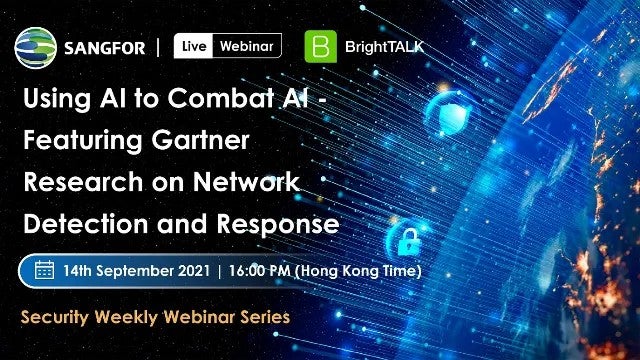As we push technology to its boundaries, we are faced with new and exciting ideas that change our lives forever. Artificial intelligence has been one of those breakthroughs. Within the last few decades, AI technology has taken tremendous leaps to change the way we see our world.
The AI revolution is here and it’s already making waves. With the success of chatbot technology like OpenAI’s ChatGPT and Google’s Bard, the uses for AI have become wider. More people are looking toward AI for different purposes – cybersecurity being at the top of the list.
In this article, we explore the potential of artificial intelligence to revolutionize the field of cybersecurity. Sangfor suggests proactively identifying and responding to threats rather than going with reactive measures. Sangfor also developed products powered by Artificial Intelligence that improve threat detection and incident response capabilities. With this article, readers can gain a deeper understanding of how AI-powered cybersecurity solutions are changing the game in the fight against cyber threats.

AI Is Changing the Cybersecurity Game
Naturally, the advent of AI technology was met with a reasonable amount of reluctance. ChatGPT – OpenAI’s leading chatbot technology – was both harshly criticized and applauded after its release a few months back. While it’s possible to note the dangers of AI, it is also possible to realize how it can be utilized best.
The goal of cybersecurity is to ensure the protection of digital infrastructure. This requires the use of modern, advanced, and innovative technology that is not afraid to test boundaries - this is exactly what AI is. The use of AI cybersecurity is not a foreign idea as most advanced cybersecurity solutions these days already use AI to improve performance.
According to Forbes, 76% of enterprises have already prioritized AI and machine learning in their IT budgets. Some of the ways cybersecurity can be improved using AI include:
Identifying Attacks
The use of AI means that malware and suspicious patterns can be identified and acted upon in seconds. AI technology can immediately spot anomalous behavior before it can cause any damage to the network. Additionally, a simple prompt to a chatbot to write an alert for specific cyber-attacks will help you create the necessary code to proactively block off attacks before they happen.
Endpoint Security
The endpoints of a network are generally the most vulnerable parts. This is why most endpoint security solutions choose AI-powered technology to identify malware, trigger alerts, or create baselines for acceptable behavior.
Automating Tasks
The whole point of AI is to make tasks easier for humans. This is why AI cybersecurity solutions focus on automating almost everything. Apart from simple efficiency, automating tasks in cybersecurity means better and consistent protection. AI takes the strain off your IT team by making it easier to analyze large data sets and create instructions to fulfill any given task.
Staying Informed
The best way to ensure your cybersecurity posture is to always stay on top of the latest news and trends. AI technology allows you to curate and store a large knowledge base of cyber threats and intelligence to make better choices and constantly “learn” new ways to protect your network.
Monitoring
The best cybersecurity requires consistency. AI provides continuous monitoring to identify and detect attacks in real-time. This also ensures automated incident response to mitigate the threat within seconds.
Tests and Improvements
AI technology can also be used to create scripts that test your company’s cybersecurity. These can then be used to improve vulnerable areas in the network.
How Sangfor’s AI Cybersecurity products combat cyberattacks?
Sangfor has presented a webinar on AI cybersecurity to better protect your organization against current & future cyber threats. You can watch the recording of a webinar Using AI to Combat AI from this link.
The webinar provides a brief overview of how Sangfor’s Cyber Command platform uses AI to combat weaponized AI and also touches on AI in threat-hunting. While AI can be effective in cybersecurity, its dangers still make it a disruptive and threatening technology when used incorrectly.

AI Security Concerns
With the introduction of AI technologies, the risks have suddenly become all too real. The leading concern with AI is generally that it will take over the world. Fortunately, we do not live in that dystopian fiction yet, however, there are pressing security risks that AI has brought along.
When OpenAI launched its hugely successful ChatGPT model in November 2022, the response was a mix of elation and fear. Most people rejoiced in the intelligent software that could effortlessly mimic human conversation and provide numerous services across different fields. However, others voiced their ChatGPT security concerns about how it could be used in the wrong hands.
The chatbot was also seen to produce false positives – which was something the company admitted to from the start. Another concern with AI was data breaches. The use of AI could potentially lead to the compromise of personal information or exploitation. Samsung went so far as the ban employees from using the chatbot after sensitive code was put into the ChatGPT by employees.
ChatGPT itself also suffered a breach recently when a bug was found in its source code. In a press release, OpenAI confirmed that the bug led to a breach of sensitive data. This allowed access to the open-source library and user chat histories.
The company also found that 1.2% of ChatGPT Plus subscribers who were active on March 20th may have had their payment information compromised. The exposed information included names, email addresses, payment addresses, credit card types, and the last four digits of credit card numbers.
The ChatGPT security issues have done no favors to the AI’s public image. However, OpenAI wasn’t the only AI candidate to receive its share of lashings in the public eye. When Google debuted its Bard chatbot software, the question of achieving sentience led to one of its senior software engineers being fired.
ChatGPT and Cybersecurity
Another ChatGPT cybersecurity concern – and possibly the largest of them all – was whether the AI could create malware by itself. The ongoing worry was that AI would make it easier for hackers to craft credible malware code or phishing emails on an automated basis.
Unfortunately, ChatGPT malware quickly became a reality when a group of underground Redditors found that they could use the AI model to write out malicious code. Forbes also noted that ChatGPT users raised the alarm that the app could code malicious software capable of spying on users’ keyboard strokes or be used to create ransomware.
OpenAI policy prohibits the use of ChatGPT to create any type of malware and has put safeguards into place to stop the chatbot from producing malicious code when prompted. However, people have still found a way around those. These ChatGPT security risks have made people more skeptical of trusting the AI model.
While these are all real threats, the limitations of AI at the moment still leave a lot of space between now and a global machine takeover. AI is still only somewhat good at writing out malware.
Should I Use AI and ChatGPT For My Company?
Technology is an ever-changing landscape of innovation, success, and failure. We cannot allow ourselves to be limited by comfort but we must also make reasonable decisions. AI has undoubtedly changed the way we work and the way we solve problems – which was ultimately its entire purpose.
AI models like ChatGPT are highly impressive and intelligent tools that can enhance and elevate the way you do everything. While the ChatGPT security implications tower overhead, it’s important to understand that these technologies are constantly evolving to be better and more secure.
Research by BlackBerry has already shown that 82% of IT decision-makers plan to invest in AI-driven cybersecurity in the next two years. Another report by Verified Market Research suggests that the market size for Artificial Intelligence in cybersecurity stood at US$ 7.58 billion in 2022 and is expected to reach US$ 80.83 billion by 2030.
The world is quickly moving forward but we should always be aware of the potential risks we face in keeping up. As recommended by the AI itself, “while ChatGPT offers a valuable service, there are legitimate security concerns that should not be ignored.”
AI is not necessarily an evil creation – it is just another tool that can be used in the wrong way sometimes. Your company will benefit from AI if you ensure that personal information is not shared, your network is secure, and you invest in adequate cybersecurity.
What better way to prepare your company for the AI revolution than to invest in cybersecurity solutions that utilize advanced AI through secure and professional platforms? That’s where Sangfor Technologies comes into the picture.
Sangfor’s AI powered innovative Solutions for you
Sangfor provides premium solutions for you and your company that can collaborate with cybersecurity AI and use coordinated protocols to ensure that the best safety measures are maintained.
The Sangfor Next Generation Firewall (NGFW) is used to identify malicious files at both the network level and endpoints. The AI-powered and cloud-based Neural-X sandbox is also used for the isolation and critical inspection of suspicious files.
Additionally, Sangfor’s advanced Endpoint Secure technology provides integrated protection against malware infections and APT breaches across your entire organization's network. It also makes use of an AI Detection Engine for improved security.
Sangfor’s Cyber Command platform uses an enhanced AI algorithm to monitor for malware, residual security events, and future potential compromises in your network. It’s also coupled with advanced Threat Intelligence technology to keep you updated on any vulnerabilities detected.
For more information on Sangfor’s cyber security and cloud computing solutions, visit www.sangfor.com.





